初中英语情态动词讲解-练习及答案
情态动词(基础讲解)

情态动词的用法【用法讲解】考试要求:中考要求掌握情态动词在一般疑问句的问与答,理解情态动词表示猜测的用法及情态动词的被动语态应用.情态动词表示说话人对某一动作或状态的态度,认为“可能”,“应该”或“必要”等。
情态动词本身词义不完全,不能独立作谓语动词,必须和动词原形连用(ought除外)。
情态动词没有人称和单复数的变化。
常用情态动词有can(could),may(might),must, ought to,have to,need, dare, shall(should),will(would)。
1. 情态动词can 和could的主要用法(1)表示能力,意为“能,会”。
Can you swim? 你能游泳吗?His granny is over eighty but still can read without glasses。
他的奶奶虽然八十多岁了,但是仍旧不用戴眼镜能够阅读。
注意:can和be able to表示“能力”时的区别:can只有现在式和过去式两种形式,而be able to除了现在式和过去式,还有将来式和完成式等多种形式.She will be able to help you tomorrow afternoon。
明天下午她将能帮助你.This is the information that I have been able to get so far.这是我到目前为止能得到的信息。
(2)表示“许可,允许"。
can 和could没有时态上的区别,could比can在语气上更客气;在回答could引导的一般疑问句时要用can。
Could/Can you tell me the way to the railway station?你能告诉我去火车站的路吗?—Could I use your pen?我可以用你的钢笔吗?—Yes,of course you can。
是,当然你可以。
完整版初中英语情态动词讲解练习及答案
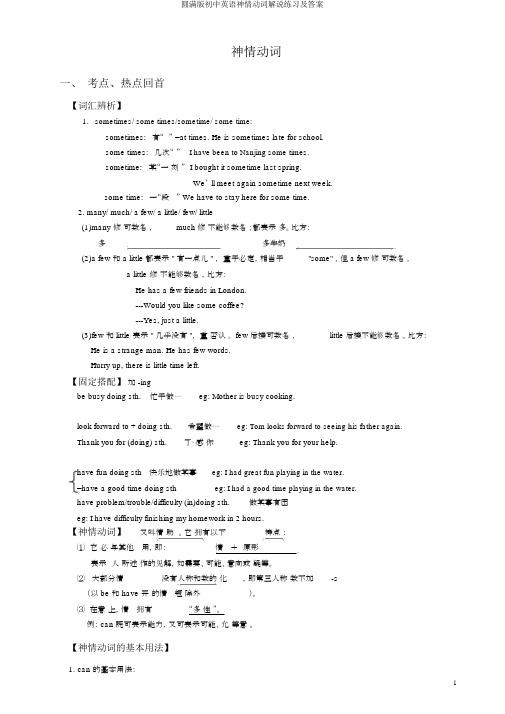
神情动词一、考点、热点回首【词汇辨析】1.sometimes/ some times/sometime/ some time:sometimes:有“ ” =at times. He is sometimes late for school.some times:几次“ ”I have been to Nanjing some times.sometime:某“一刻” I bought it sometime last spring.We’ ll meet again sometime next week.some time:一“段” We have to stay here for some time.2. many/ much/ a few/ a little/ few/ little(1)many 修可数名,much 修不能够数名;都表示多。
比方:多多牛奶(2)a few 和 a little 都表示 " 有一点儿 " ,重于必定,相当于"some" ,但 a few 修可数名,a little 修不能够数名,比方:He has a few friends in London.---Would you like some coffee?---Yes, just a little.(3)few 和 little 表示 " 几乎没有 ",重否认。
few 后接可数名,little 后接不能够数名。
比方:He is a strange man. He has few words.Hurry up, there is little time left.【固定搭配】加 -ingbe busy doing sth.忙于做⋯⋯eg: Mother is busy cooking.look forward to + doing sth.希望做⋯⋯eg: Tom looks forward to seeing his father again.Thank you for (doing) sth.了⋯感你eg: Thank you for your help.have fun doing sth快乐地做某事eg: I had great fun playing in the water.=have a good time doing sth eg: I had a good time playing in the water.have problem/trouble/difficulty (in)doing sth.做某事有困eg: I have difficulty finishing my homework in 2 hours.【神情动词】又叫情助。
初中英语情态动词专项练习(附答案解析)
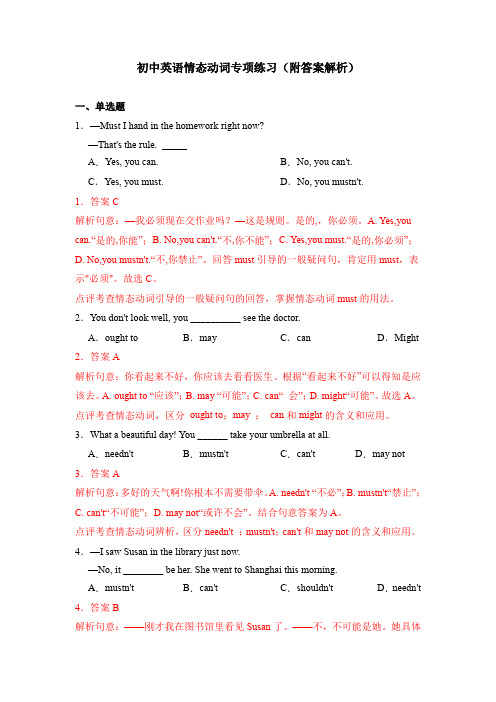
初中英语情态动词专项练习(附答案解析)一、单选题1.—Must I hand in the homework right now?—That's the rule.A.Yes, you can.B.No, you can't.C.Yes, you must.D.No, you mustn't.1.答案C解析句意:—我必须现在交作业吗?—这是规则。
是的,,你必须。
A. Yes,you can.“是的,你能”;B. No,you can't.“不,你不能”;C. Yes,you must.“是的,你必须”;D. No,you mustn't.“不,你禁止”。
回答must引导的一般疑问句,肯定用must,表示"必须"。
故选C。
点评考查情态动词引导的一般疑问句的回答,掌握情态动词must的用法。
2.You don't look well, you __________ see the doctor.A.ought to B.may C.can D.Might 2.答案A解析句意:你看起来不好,你应该去看看医生。
根据“看起来不好”可以得知是应该去。
A. ought to “应该”;B. may “可能”;C. can“ 会”;D. might“可能”。
故选A。
点评考查情态动词,区分ought to;may ;can和might的含义和应用。
3.What a beautiful day! You ______ take your umbrella at all.A.needn't B.mustn't C.can't D.may not 3.答案A解析句意:多好的天气啊!你根本不需要带伞。
A. needn't “不必”;B. mustn't“禁止”;C. can't“不可能”;D. may not“或许不会”。
(完整版)初中英语情态动词讲解练习及答案.doc
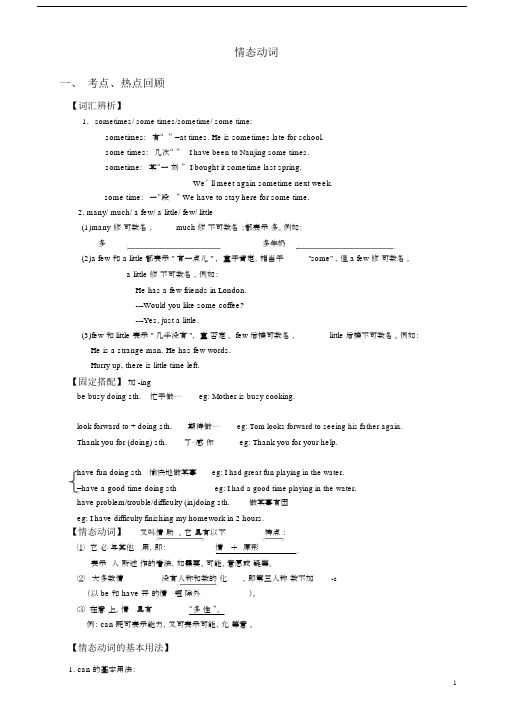
情态动词一、考点、热点回顾【词汇辨析】1.sometimes/ some times/sometime/ some time:sometimes:有“ ”=at times. He is sometimes late for school.some times:几次“ ”I have been to Nanjing some times.sometime:某“一刻”I bought it sometime last spring.We’ ll meet again sometime next week.some time:一“段”We have to stay here for some time.2. many/ much/ a few/ a little/ few/ little(1)many 修可数名,much 修不可数名;都表示多。
例如:多多牛奶(2)a few 和 a little 都表示 " 有一点儿 " ,重于肯定,相当于"some" ,但 a few 修可数名,a little 修不可数名,例如:He has a few friends in London.---Would you like some coffee?---Yes, just a little.(3)few 和 little 表示 " 几乎没有 ",重否定。
few 后接可数名,little 后接不可数名。
例如:He is a strange man. He has few words.Hurry up, there is little time left.【固定搭配】加 -ingbe busy doing sth.忙于做⋯⋯eg: Mother is busy cooking.look forward to + doing sth.期待做⋯⋯eg: Tom looks forward to seeing his father again.Thank you for (doing) sth.了⋯感你eg: Thank you for your help.have fun doing sth愉快地做某事eg: I had great fun playing in the water.=have a good time doing sth eg: I had a good time playing in the water.have problem/trouble/difficulty (in)doing sth.做某事有困eg: I have difficulty finishing my homework in 2 hours.【情态动词】又叫情助。
初中英语2025届中考动词考点分类讲解练习(实义动词+系动词+助动词+情态动词)
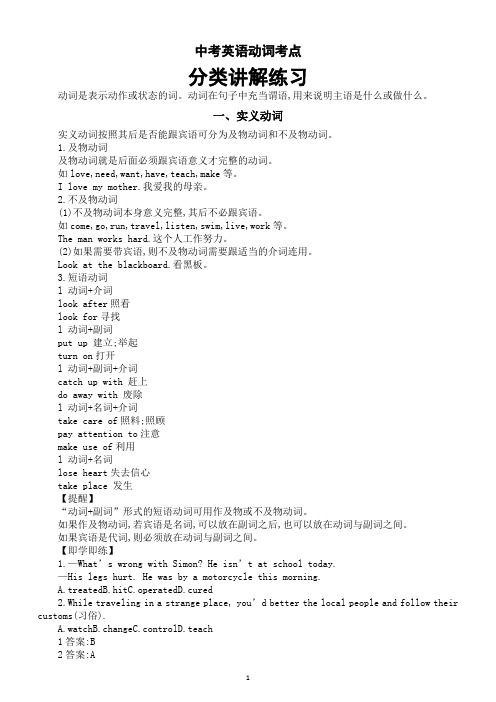
中考英语动词考点分类讲解练习动词是表示动作或状态的词。
动词在句子中充当谓语,用来说明主语是什么或做什么。
一、实义动词实义动词按照其后是否能跟宾语可分为及物动词和不及物动词。
1.及物动词及物动词就是后面必须跟宾语意义才完整的动词。
如love,need,want,have,teach,make等。
I love my mother.我爱我的母亲。
2.不及物动词(1)不及物动词本身意义完整,其后不必跟宾语。
如come,go,run,travel,listen,swim,live,work等。
The man works hard.这个人工作努力。
(2)如果需要带宾语,则不及物动词需要跟适当的介词连用。
Look at the blackboard.看黑板。
3.短语动词l 动词+介词look after照看look for寻找l 动词+副词put up 建立;举起turn on打开l 动词+副词+介词catch up with 赶上do away with 废除l 动词+名词+介词take care of照料;照顾pay attention to注意make use of利用l 动词+名词lose heart失去信心take place 发生【提醒】“动词+副词”形式的短语动词可用作及物或不及物动词。
如果作及物动词,若宾语是名词,可以放在副词之后,也可以放在动词与副词之间。
如果宾语是代词,则必须放在动词与副词之间。
【即学即练】1.—What’s wrong with Simon? He isn’t at school today.—His legs hurt. He was by a motorcycle this morning.A.treatedB.hitC.operatedD.cured2.While traveling in a strange place, you’d better the local people and follow their customs(习俗).A.watchB.changeC.controlD.teach1答案:B2答案:A二、系动词系动词不能单独作谓语,必须与表语一起构成谓语。
初中英语情态动词练习题及答案
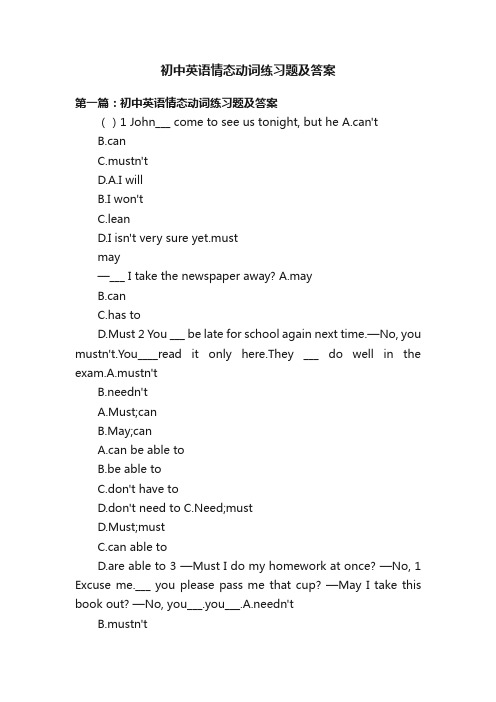
初中英语情态动词练习题及答案第一篇:初中英语情态动词练习题及答案()1 John___ come to see us tonight, but he A.can'tB.canC.mustn'tD.A.I willB.I won'tC.leanD.I isn't very sure yet.mustmay—___ I take the newspaper away? A.mayB.canC.has toD.Must 2 You ___ be late for school again next time.—No, you mustn't.You____read it only here.They ___ do well in the exam.A.mustn'tB.needn'tA.Must;canB.May;canA.can be able toB.be able toC.don't have toD.don't need to C.Need;mustD.Must;mustC.can able toD.are able to 3 —Must I do my homework at once? —No, 1 Excuse me.___ you please pass me that cup? —May I take this book out? —No, you___.you___.A.needn'tB.mustn'tC.can'tA.DoB.ShouldC.WouldD.Must A.can'tB.may notC.needn'tD.aren'tYou___ go and see a doctor at once because you're got a fever.A.canB.mustC.dareD.would—Can you speak Japanese? —No, I____.A.mustn'tB.can'tC.needn'tD.may not 1.– He___ be in the classroom, I think —No, he ___ be in the classroom.I saw him go home a minute ago.A.can;may not B.must;may notC.may;can'tD.may;mustn't —Shall I get one more cake for you, Dad? —Thanks, but you___, I've had enough.A.may not B.must notC.can'tD.needn't Even the top students in our class can't work out this problem, so itbe very difficult.A.mayB.mustC.canD.need 4 He isn't at school.I think he ___ be ill.A.canB.shallC.mustD.has to 5 ___ I take this one?A.MayB.WillC.AreD.Do 1 The children___ play football on the road.D.may not His arm is all right.He___ go and see the doctor.A.has not toB.don't have toC.haven't toD.doesn't have toHe had to give up the plan, ___ he?A.didB.didn'tC.doesD.doesn't They had to walk here, ___ they?A.mustn'tB.didC.didn'tD.hadn't He had better stay here, ___ he?A.doesn'tB.don'tC.hadn'tD.isn't 2 You'd better___late next time.A.not to be B.not beC.won't beD.don't beYou'd better ___ your hair ___ once a month.A.had;cutB.had;cuttedC.have;cutD.have;cutted 4 You___ ask that man over there.Maybe he knows the way.A.had better not toB.had not betterC.had betterD.had better not 1 —Shall we go and visit the History Museum next Sunday? —________ A.Here you areB.Sorry, I can'tC.Yes, pleaseD.Let me try —Why don't you ask Mike to go with us? —Thanks, ___.___ you like to have another try?A.CouldB.WillC.WouldD.Do 3 —Would you like to go boating with us? —Yes, ___.A.I'd likeB.I wantC.I'd like toD.I do 1 You___ worry about your son.He willget well soon.A.needn'tB.can'tC.mustn'tD.have toThe poor man needs our help, ___ he?A.needB.needn'tC.doesD.doesn't —Must we do our homework first? —No, you___.You may have a rest first.A.mustn't B.needn't C.may not D.can't 1.I told Sally how to get here, but perhaps I _______ for her.A.had to write it out B.must have written it out C.should have written it outD.ought to write it out 2.—There were already five people in the car but they managed to take me as well.—It _______ a comfortable journey.A.can’t beB.shouldn’t beC.mustn’t have beenD.couldn’t have been 3.It’s nearly seven o’clock.Jack _______ be here at any moment.A.must B.NeedC.shouldD.can 4.Johnny, you _______ play with the knife, you _______ hurt yourself.A.won’t;can’tB.mustn’t;mayC.shouldn’t;mustD.can’t;shouldn’t 5.The fire spread through the hotel veryquickly but everyone _______ get out.A.had toB.wouldC.couldD.was able to6.—When can I come for the photos? I need them tomorrow afternoon.—They _______ be ready by 12:00.A.canB.shouldC.mightD.need7.—I stayed at a hotel while in New York.—Oh, did you? You _______ with Barbara.A.could have stayedB.could stayC.would stayD.must have stayed8.—Are you coming to Jeff’s party?—I’m not sure.I _______ go to the concert instead.A.mustB.wouldC.shouldD.might9.I was really anxious about you.You _______ home without a word.A.mustn’t leaveB.shouldn’t have leftC.couldn’t have leftD.needn’t leave10.—Is John coming by train?—He should, but he _______ not.He likes driving his car.A.mustB.canC.needD.may11.A left-luggage office is a place where bags _____ be left fora short time, especially at a railway station.A.should B.canC.mustD.will12.I wonder how he _______ that to the teacher.A.dare to sayB.dare sayingC.not dare sayD.dared say13.When he was there, he ___ go to that coffee shop at the corner after work every day.A.would B.shouldC.had betterD.might14.It has been announced that candidates _____ remain in their seats until all the papers have been collected.A.canB.willC.mayD.shall15.How ______ou say that you really understand the whole story if you have covered only a part of the article?A.canB.mustC.needD.may 16.—I hear you’ve got a set of valuable Australian coin._______ I have a look?—Yes, certainly.A.DoB.MayC.ShallD.Should 【巧学活用参考答案】1.1-5 A D A B B2.1-5 C D B C A3.1-3 C A A4.1-3 D B C5.1-4 C B C C6.1-3 B A B7.1-3 C C C8.1-3 A D B 情态动词练习参考答案1.C。
七年级英语情态动词can和could辨析单选题30题答案解析版
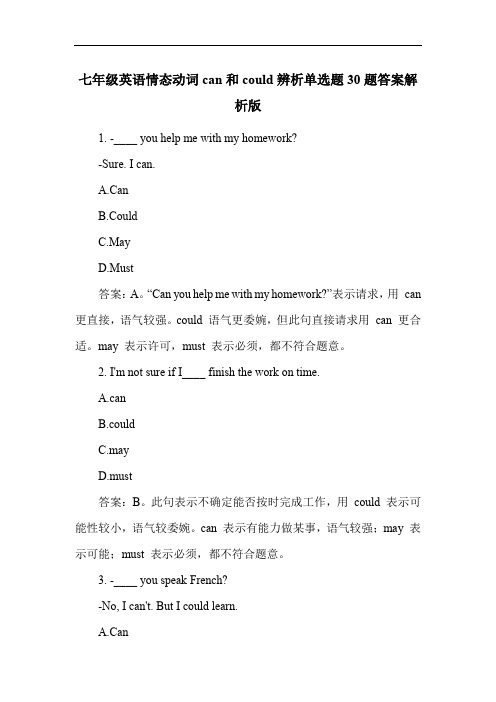
七年级英语情态动词can和could辨析单选题30题答案解析版1. -____ you help me with my homework?-Sure. I can.A.CanB.CouldC.MayD.Must答案:A。
“Can you help me with my homework?”表示请求,用can 更直接,语气较强。
could 语气更委婉,但此句直接请求用can 更合适。
may 表示许可,must 表示必须,都不符合题意。
2. I'm not sure if I____ finish the work on time.A.canB.couldC.mayD.must答案:B。
此句表示不确定能否按时完成工作,用could 表示可能性较小,语气较委婉。
can 表示有能力做某事,语气较强;may 表示可能;must 表示必须,都不符合题意。
3. -____ you speak French?-No, I can't. But I could learn.A.CanB.CouldC.MayD.Must答案:A。
问句询问现在是否会说法语,用can。
could 表示过去的能力或委婉的请求等,此处不合适。
may 表示许可,must 表示必须,都不符合题意。
4. He____ play basketball very well when he was young.A.canB.couldC.mayD.must答案:B。
表示过去的能力用could。
can 表示现在的能力;may 表示可能;must 表示必须,都不符合题意。
5. -____ I borrow your pen?-Sure. Here you are.A.CanB.CouldC.MayD.Must答案:A。
“Can I borrow your pen?”表示请求,用can 更直接。
could 语气更委婉,但此句直接请求用can 更合适。
完整word版小学初中英语情态动词详细用法归纳含练习及答案,文档
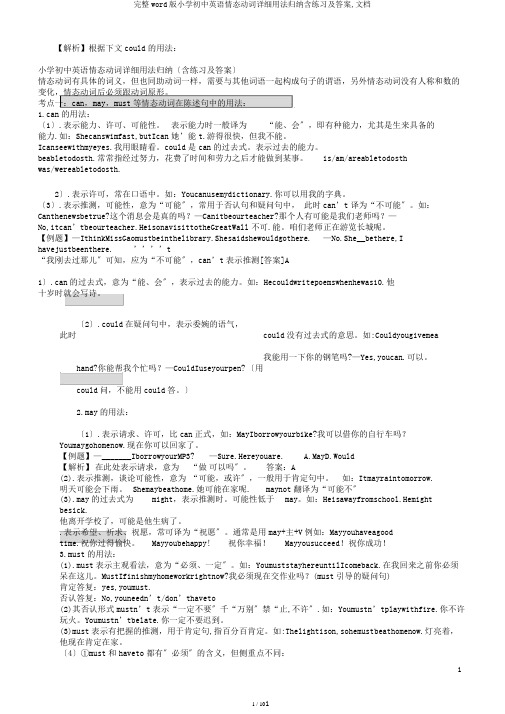
【解析】根据下文could的用法:小学初中英语情态动词详细用法归纳〔含练习及答案〕情态动词有具体的词义,但也同助动词一样,需要与其他词语一起构成句子的谓语,另外情态动词没有人称和数的变化,情态动词后必须跟动词原形。
考点一:can,may,must 等情态动词在陈述句中的用法:1.can的用法:〔1〕.表示能力、许可、可能性。
表示能力时一般译为“能、会〞,即有种能力,尤其是生来具备的能力.如:Shecanswimfast,butIcan 她’能t.游得很快,但我不能。
Icanseewithmyeyes.我用眼睛看。
could是can的过去式。
表示过去的能力。
beabletodosth.常常指经过努力,花费了时间和劳力之后才能做到某事。
is/am/areabletodosthwas/wereabletodosth.2〕.表示许可,常在口语中。
如:Youcanusemydictionary.你可以用我的字典。
〔3〕.表示推测,可能性,意为“可能〞,常用于否认句和疑问句中,此时can’t译为“不可能〞。
如:Canthenewsbetrue?这个消息会是真的吗?—Canitbeourteacher?那个人有可能是我们老师吗?—No,itcan’tbeourteacher.HeisonavisittotheGreatWall不可.能。
咱们老师正在游览长城呢。
【例题】—IthinkMissGaomustbeinthelibrary.Shesaidshewouldgothere. —No.She__bethere,I havejustbeenthere. ’’’’t“我刚去过那儿〞可知,应为“不可能〞,can’t表示推测[答案]A1〕.can的过去式,意为“能、会〞,表示过去的能力。
如:Hecouldwritepoemswhenhewas10.他十岁时就会写诗。
〔2〕.could在疑问句中,表示委婉的语气,此时could没有过去式的意思。
情态动词讲解及练习(含答案)
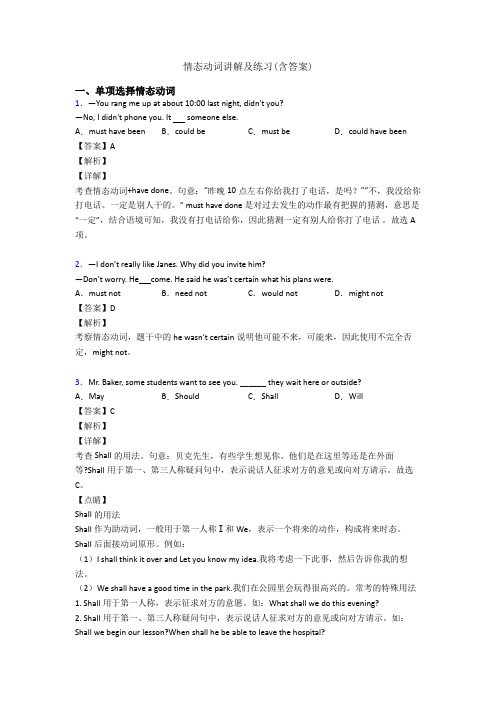
情态动词讲解及练习(含答案)一、单项选择情态动词1.—You rang me up at about 10:00 last night, didn't you?—No, I didn't phone you. It someone else.A.must have been B.could be C.must be D.could have been 【答案】A【解析】【详解】考查情态动词+have done。
句意:“昨晚10点左右你给我打了电话,是吗?”“不,我没给你打电话。
一定是别人干的。
” must have done 是对过去发生的动作最有把握的猜测,意思是“一定”,结合语境可知,我没有打电话给你,因此猜测一定有别人给你打了电话。
故选A 项。
2.—I don’t really like Janes. Why did you invite him?—Don’t worry. He come. He said he was’t certain what his plans were.A.must not B.need not C.would not D.might not【答案】D【解析】考察情态动词,题干中的he wasn’t certain说明他可能不来,可能来,因此使用不完全否定,might not。
3.Mr. Baker, some students want to see you. ______ they wait here or outside?A.May B.Should C.Shall D.Will【答案】C【解析】【详解】考查Shall的用法。
句意:贝克先生,有些学生想见你。
他们是在这里等还是在外面等?Shall用于第一、第三人称疑问句中,表示说话人征求对方的意见或向对方请示。
故选C。
【点睛】Shall的用法Shall作为助动词,一般用于第一人称Ⅰ和We,表示一个将来的动作,构成将来时态。
2021年上海市中考英语语法复习:情态动词讲解及提升练习(有答案)
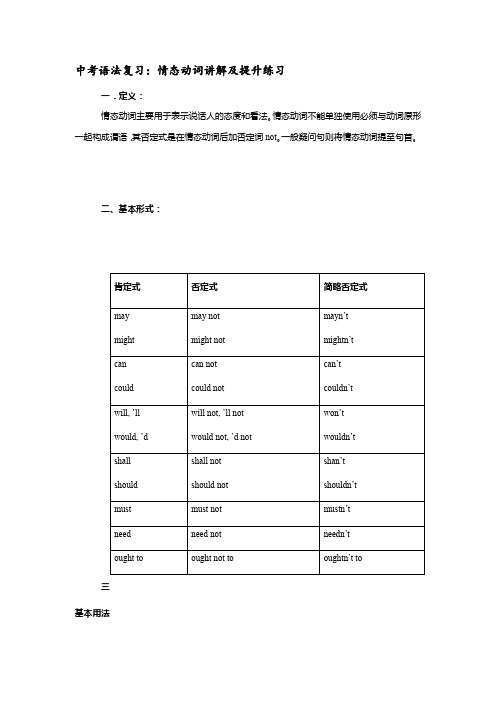
中考语法复习:情态动词讲解及提升练习一.定义:情态动词主要用于表示说话人的态度和看法。
情态动词不能单独使用必须与动词原形一起构成谓语,其否定式是在情态动词后加否定词not。
一般疑问句则将情态动词提至句首。
二、基本形式:三基本用法1. can 的用法1)表能力can表能力时意味着凭体力或脑力或技术等可以无甚阻力地去做某事。
I can climb this pole. 我能爬这根杆子。
He is only four , but he can read. 他只有4岁,但已认得字了。
Fire can’t destroy gold. 火烧不毁金子。
2)表可能性多用于否定与疑问结构中,但也可用在肯定句中。
Can the news be true? 这消息可能是真的吗?It can’t be true. 它不可能是真的。
What can he possibly mean? 他可能是什么意思?3)表示允许(和may意思相近)常见于口语。
Can (May) I come in ? 我能进来吗?Can I smoke here ? 我可以在这里抽烟吗?2.could的用法1)表过去的可能和许可,Father said I could swim in the river. 爸爸说我可以在河里游泳。
2)表过去的能力I could swim when I was only six. 我刚六岁就能游泳。
3)表“允许”。
可表示委婉客气的提出问题或陈述看法,不是can的过去时态。
---Could I use your bike? ---Yes, you can./No, you can’t.注意:be able to 表示能力,意为“能够做成某事”,相当于can 的用法,但是有区别:can泛指一般的能力;be able to 则主要指成功做了某件事的能力。
3. may(might)的用法1)表示请求、可以、允许。
You may drive the tractor. 你可以开那台拖拉机。
中考初中语法祈使句情态动词专题讲解与练习

中考初中语法祈使句情态动词专题讲解与练习情态动词一.情态动词can_________________ can’t_____________________May_________________ may not______________________Must______________ mustn’t_______________________二、情态动词的特点1. 情态动词无人称和数的变化,2. 情态动词后面跟的动词需用原形,否定式构成是在情态动词后面加 "not"。
3. 个别情态动词有过去式, 过去式用来表达更客气, 委婉的语气, 时态性不强, 可用于过去,现在。
三、情态动词的用法1. can/could;can’t/couldn’t (否定)1) 表示能力, 意为“能、会”, 例如:I can speak a little English. -- Can you ride a bike?I can’t swim. -- Yes, I can. / No, I can’t.2) 表示请求或允许,多用于口语中,意为“可以、能”等You can go home now. 现在你可以回家了 -- Can I borrow your bike?You can’t stop your car here. -- Yes, you can. / No, you can’t.3) 用于否定句、疑问句中,表示猜测、怀疑或不肯定.Lucy can’t be at home now, she went to the park just now.Where can it be? I can’t find my football.【注意:】1). could 是can的过去式, 有两种用法, 一种表示过去式;一种用来表达更加客气, 委婉的语气, 时态性不强, 可用于过去,现在。
2). be able to 意为“有能力,能够做...”, 相当于can/could, 但它有人称,数和时态的变化。
人教版英语英语情态动词含答案解析百度文库
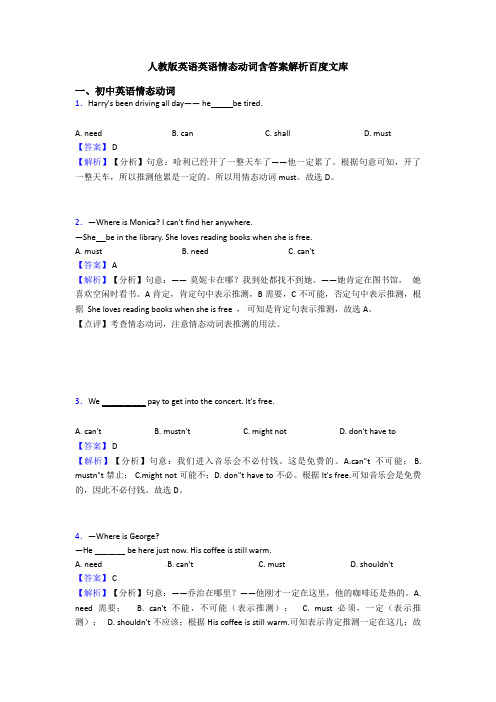
人教版英语英语情态动词含答案解析百度文库一、初中英语情态动词1.Harry's been driving all day—— he be tired.A. needB. canC. shallD. must【答案】 D【解析】【分析】句意:哈利已经开了一整天车了——他一定累了。
根据句意可知,开了一整天车,所以推测他累是一定的。
所以用情态动词must。
故选D。
2.—Where is Monica? I can't find her anywhere.—She be in the library. She loves reading books when she is free.A. mustB. needC. can't【答案】 A【解析】【分析】句意:——莫妮卡在哪?我到处都找不到她。
——她肯定在图书馆,她喜欢空闲时看书。
A肯定,肯定句中表示推测,B需要,C不可能,否定句中表示推测,根据 She loves reading books when she is free ,可知是肯定句表示推测,故选A。
【点评】考查情态动词,注意情态动词表推测的用法。
3.We __________ pay to get into the concert. It's free.A. can'tB. mustn'tC. might notD. don't have to【答案】 D【解析】【分析】句意:我们进入音乐会不必付钱。
这是免费的。
A.can"t 不可能; B. mustn"t 禁止; C.might not 可能不;D. don"t have to不必。
根据It's free.可知音乐会是免费的,因此不必付钱。
故选D。
4.—Where is George?—He _______ be here just now. His coffee is still warm.A. needB. can'tC. mustD. shouldn't【答案】 C【解析】【分析】句意:——乔治在哪里?——他刚才一定在这里,他的咖啡还是热的。
情态动词专项讲解及练习
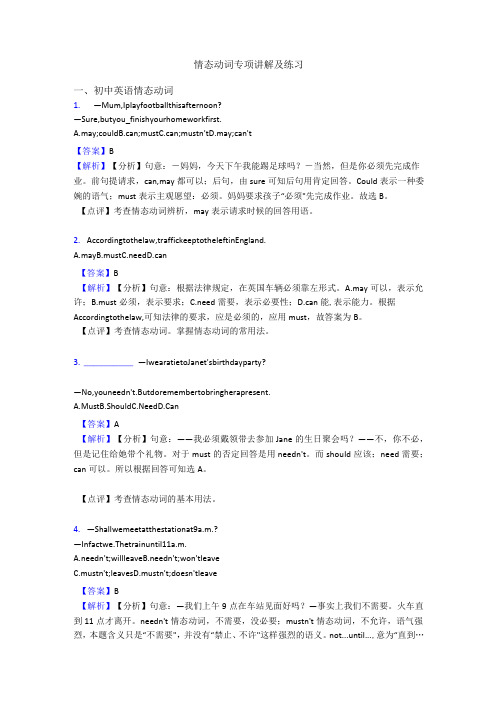
情态动词专项讲解及练习一、初中英语情态动词1.—Mum,Iplayfootballthisafternoon?—Sure,butyou_finishyourhomeworkfirst.A.may;couldB.can;mustC.can;mustn'tD.may;can't【答案】B【解析】【分析】句意:-妈妈,今天下午我能踢足球吗?-当然,但是你必须先完成作业。
前句提请求,can,may都可以;后句,由sure可知后句用肯定回答。
Could表示一种委婉的语气;must表示主观愿望:必须。
妈妈要求孩子“必须"先完成作业。
故选B。
【点评】考查情态动词辨析,may表示请求时候的回答用语。
2.Accordingtothelaw,traffickeeptotheleftinEngland.A.mayB.mustC.needD.can【答案】B【解析】【分析】句意:根据法律规定,在英国车辆必须靠左形式。
A.may可以,表示允许;B.must必须,表示要求;C.need需要,表示必要性;D.can能,表示能力。
根据Accordingtothelaw,可知法律的要求,应是必须的,应用must,故答案为B。
【点评】考查情态动词。
掌握情态动词的常用法。
3.__________ —IwearatietoJanet'sbirthdayparty?—No,youneedn't.Butdoremembertobringherapresent.A.MustB.ShouldC.NeedD.Can【答案】A【解析】【分析】句意:——我必须戴领带去参加Jane的生日聚会吗?——不,你不必,但是记住给她带个礼物。
对于must的否定回答是用needn't。
而should应该;need需要;can可以。
所以根据回答可知选A。
【点评】考查情态动词的基本用法。
4.—Shallwemeetatthestationat9a.m.?—Infactwe.Thetrainuntil11a.m.A.needn't;willleaveB.needn't;won'tleaveC.mustn't;leavesD.mustn't;doesn'tleave【答案】B【解析】【分析】句意:—我们上午9点在车站见面好吗?—事实上我们不需要。
初中英语情态动词详细用法归纳(含练习及答案)
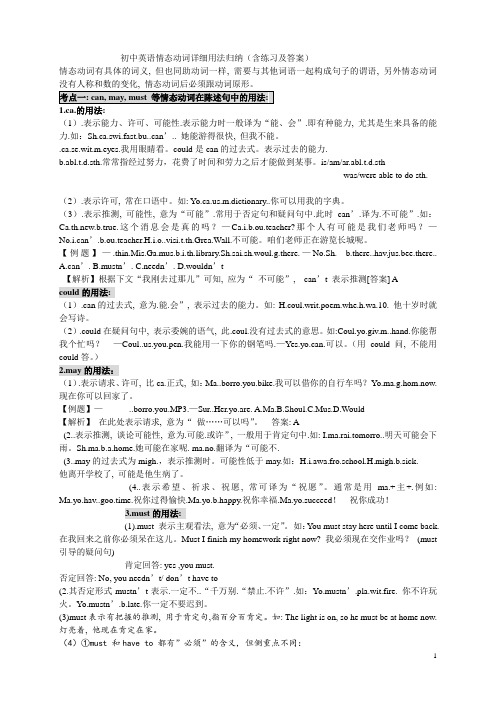
初中英语情态动词详细用法归纳(含练习及答案)情态动词有具体的词义, 但也同助动词一样, 需要与其他词语一起构成句子的谓语, 另外情态动词没有人称和数的变化, 情态动词后必须跟动词原形。
1.ca.的用法:(1).表示能力、许可、可能性.表示能力时一般译为“能、会”.即有种能力, 尤其是生来具备的能力.如:Sh.ca.swi.fast.bu..can’.. 她能游得很快, 但我不能。
.ca.se.wit.m.eyes.我用眼睛看。
could是can的过去式。
表示过去的能力.b.abl.t.d.sth.常常指经过努力,花费了时间和劳力之后才能做到某事。
is/am/ar.abl.t.d.sthwas/were able to do sth.(2).表示许可, 常在口语中。
如: .m.dictionary..你可以用我的字典。
(3).表示推测, 可能性, 意为“可能”.常用于否定句和疑问句中.此时can’.译为.不可能”.如:Ca.th.new.b.true.这个消息会是真的吗?—Ca.i.b.ou.teacher?那个人有可能是我们老师吗?—No.i.can’.b.ou.teacher.H.i.o..visi.t.th.Grea.Wall.不可能。
咱们老师正在游览长城呢。
【例题】—.thin.Mis.Ga.mus.b.i.th.library.Sh.sai.sh.woul.g.there.—No.Sh.__b.there..hav.jus.bee.there..A.can’.B.mustn’.C.needn’.D.wouldn’t【解析】根据下文“我刚去过那儿”可知, 应为“不可能”, can’t 表示推测[答案] Acould的用法:(1).can的过去式, 意为.能.会”, 表示过去的能力。
如: H.coul.writ.poem.whe.h.wa.10. 他十岁时就会写诗。
(2).could在疑问句中, 表示委婉的语气, 此.coul.没有过去式的意思。
八年级上册译林版初中语法英语情态动词讲解含答案
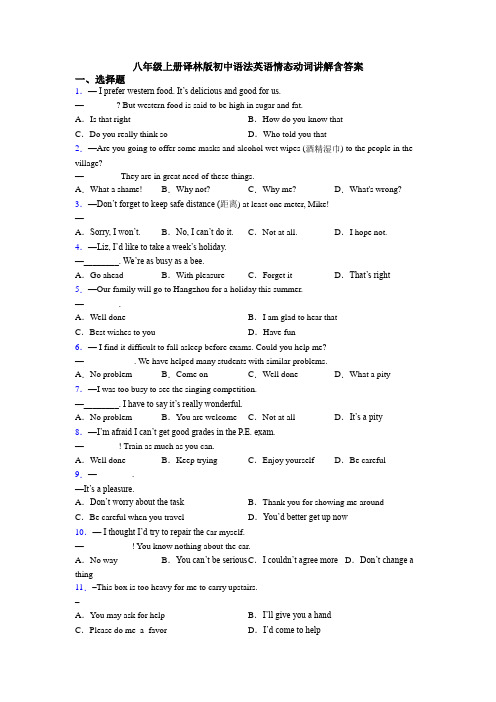
八年级上册译林版初中语法英语情态动词讲解含答案一、选择题1.—I prefer western food. It’s delicious and good for us.—_______ ? But western food is said to be high in sugar and fat.A.Is that right B.How do you know thatC.Do you really think so D.Who told you that2.—Are you going to offer some masks and alcohol wet wipes (酒精湿巾) to the people in the village?—________ They are in great need of these things.A.What a shame! B.Why not? C.Why me? D.What's wrong? 3.—Don’t forget to keep safe distance (距离) at least one meter, Mike!—________A.Sorry, I won’t.B.No, I can’t do it.C.Not at all. D.I hope not. 4.—Liz, I’d like to take a week’s holiday.—________. We’re as busy as a bee.A.Go ahead B.With pleasure C.Forget it D.That’s right 5.—Our family will go to Hangzhou for a holiday this summer.—________.A.Well done B.I am glad to hear thatC.Best wishes to you D.Have fun6.— I find it difficult to fall asleep before exams. Could you help me?— ___________. We have helped many students with similar problems.A.No problem B.Come on C.Well done D.What a pity 7.—I was too busy to see the singing competition.—________. I have to say it’s really wonderful.A.No problem B.You are welcome C.Not at all D.It’s a pity 8.—I’m afraid I can’t get good grades in the P.E. exam.—________! Train as much as you can.A.Well done B.Keep trying C.Enjoy yourself D.Be careful 9.—________.—It’s a pleasure.A.Don’t worry about the task B.Thank you for showing me aroundC.Be careful when you travel D.You’d better get up now10.—I thought I’d try to repair the c ar myself.— __________ ! You know nothing about the car.A.No way B.You can’t be serious C.I couldn’t agree more D.Don’t change a thing11.–This box is too heavy for me to carry upstairs.–__________A.You may ask for help B.I’ll give you a handC.Please do me a favor D.I’d come to help12.—Can I look at the menu for a few more minutes before I decide?—Of course. ________, Sir.A.Make yourself at home B.Enjoy yourself C.It doesn’t matterD.Take your time13.—It’s been a wonderful party. Thank you very much?—- ________________.A.With pleasure B.No , thanks C.It’s OK D.I’m glad you enjoyed it .14.— I guess you want to play tennis in the park this afternoon.—_______. That’s exactly what I was thinking just now.A.It’s up to you B.Of course not C.You read my mind D.It’s hard to say 15.--Would you mind opening the window? It’s too hot.--__________.A.Sorry. I wouldn’t.B.No, of course not.C.It doesn’t matter.D.Yes, please.16.— Could you please clean your room?—_________. I’ll do it at once.A.Yes, sure B.Sorry, I can’t C.It doesn’t matter D.Here you are 17.-Do you mind telling me how to use this function? - . It’s easy. Just double-click on the “Pencil” icon.A.No, not at all B.Of course, I doC.Yes, I do D.Yes, I don’t18.—Lucy, can you help me with my history?—________. I am good at it.A.With pleasure B.I’m afraid not C.Sorry, I can’t D.No way 19.— Shall we go to Nanjing Green Expo Park to enjoy the beautiful flowers this afternoon?—________. Let’s go there by bike.A.I think so B.Tha t’s all right C.My pleasure D.Sounds great 20.—TV says there will be a heavy rain tomorrow.—________. I planned to go climbing with my friend.A.Bad luck B.I hope so C.Good idea D.I don’t mind 21.—Sir, this is your order, two chicken hamburgers and a cup of coffee. ________—I’ll have them here.A.For here or to go? B.Something to drink? C.Anything else? D.Is that OK? 22.—I missed the basketball game last Saturday because I had an exam.—________, but it will be repeated on TV.A.Take it easy B.You are lucky C.That’s wonderful D.Never mind 23.—I’m sorry I didn’t make it to your birthday party last night.— ________ I know you are busy recently.A.Why not? B.Don’t mention it.C.No way. D.That’s all right. 24.—You seem so happy today, Jack.—________? I won the first prize in the singing competition yesterday.A.So what B.How come C.Guess what D.Why not 25.—I’m sorry. That wasn’t of much help.— ________. In fact, it was most helpful.A.Thanks anyway B.It doesn’t matter C.Of course not D.Sure it was 26.—I’l l be away on a business trip. Would you mind looking after my cat?—Not at all. ________.A.It’s my pleasure B.I’d rather not.C.I’d like it.D.With pleasure. 27.—Could you help me look after my baby ________ I am away?—________.A.as; With pleasure B.while; My pleasure C.as; That’s all right D.while; With pleasure28.—How would you like your soup?—________.A.Very delicious B.With some tomatoes and eggs, please C.I like it very much D.No, thanks29.—Time is up. I have to go now.—________ ! We don’t have more time to talk.A.That’s cool B.That’s the answer C.That’s a pity D.That’s good news 30.—How do you find the documentary DA VID Profile(国宝档案).—________. I can’t think too highly of it.A.It all depends B.It’s really wonderfulC.No one knows for certain D.It is not my cup of tea31.—Would you mind if I open the window?—_______.We need fresh air.A.Not at all B.Yes, of course C.You’d better not D.That’s all right 32.— Mr. Smith, I won the first prize in the competition.—______ I think you’ll do b etter and better.A.Congratulations! B.Good idea! C.That’s all right!D.What a shame! 33.— May I have a look at the newspaper China Daily?— Certainly. ________A.Thank you. B.It’s a pity.C.Here you are. D.I’d like to. 34.—Hi, everybody! Here is the music.—________. Let’s dance to the music.A.That’s no good B.Here we go C.That’s a shame D.Have a good time 35.— Mike, are you ready for the coming final exam?— ________. I have prepared it for weeks.A.You bet B.No deal C.Bad luck D.Have fun 36.— Do you think Steve will pass the exam this time?— ________! He spends most of his time playing games on the phone.A.Promise B.No way C.Well done D.No problem 37.—I’m so sorry to keep you waiting for me so long.— ________!A.With pleasure. B.Don’t say so C.I do n’t think so D.It doesn’t matter 38.—Many people think women are better at cooking than men.—________. Most top chefs in the world are men.A.I agree B.I can’t agree more C.Not at all D.That’s not the case 39.—Can you tell me how to get to the park?—________—Thank you all the same.A.Show me the map, please.B.Certainly. It’s opposite the museum.C.Sorry, I don’t know. I’m a stranger here.D.Sure. Turn right and go along Rock Road.40.—Thank you for helping to build hospitals during this special period.— ________ ! Many hands make light work.A.My pleasure B.All right C.Never mind D.None of my business41.— Would you mind my turning on the TV? The New Year concert has just begun.— ________. Just go ahead.A.Please don’t B.Better not C.Of course not D.I’m afraid not 42.—Do you think you could finish this project without help?—________. This is not the first time for me.A.Take care B.Don’t worry C.Not exactly D.Hurry up 43.—Our school football team has won the first prize in the match!—________A.Have a good time. B.Nice work. C.Never mind. D.Good luck. 44.—We can invite Kate and Paul to Baohe Park with us.—________ I’ll give them a call right now.A.Why not? B.What for? C.What’s up?D.Are you kidding? 45.—Mum, Joe has broken a cup!—________. Accidents always happen.A.Pretty good B.Of course C.It doesn’t matter D.That depends 46.— The movie Lost in Russia sends a message about the importance of family.— ________. It reminds me of my parents.A.I hope so B.That’s all right C.You bet D.I don’t think so 47.— The dress I got is not the same color as that is shown online.—________? But if so, I promise we will send you another one.A.How come B.Who knows C.What for D.Why worry 48.—Michael was late for Mr. Smith’s chemistry class this morning.—________? As far as I know, he never came late to class.A.So what B.Why not C.How come D.Who cares49.— Are you feeling any better now after taking the medicine?—________. I’m feeling even worse.A.You got it B.Never mind C.Sorry to hear that D.Quite the opposite 50.—How about buying that coat?—________. It’s too expensive. I can’t afford it.A.That sounds good B.No way C.Good idea D.What a pity【参考答案】***试卷处理标记,请不要删除一、选择题1.C【详解】句意:——我更喜欢西餐。
英语情态动词讲解及练习(附答案)

英语情态动词讲解及练习(附答案)情态动词讲解定义:情态动词表示说话人对动作的态度,比如:需要,可能,意愿,猜测或者怀疑等等。
情态动词本身有一定意思,但不完全,不能单独作谓语,必须与动词原形连用。
否定句中,在情态动词后面加not。
情态动词有:must, shall, should, had better 词形无变化can(could), may(might), will(would) 词形有变化need既可以是情态动词,也可以是实义动词,具有双重性。
一、can 表示“能,会”,否定为:can’t = can not = cannot 其过去式为:could→couldn’t(1)表示会做某事,有能力做某事。
意思= be able toe.g. He can speak English, but he can’t speak Japanese.= He is able to speak English, but he isn’t able to speak Japanese.I could smile but I couldn’t speak w hen I was 2 months old.= I was able to smile but I wans’t able to speak when I was 2 months old.区别:① can只用于现在时和过去时(could), be able to 可用于各种时态。
e.g. They will be able to tell you the news soon.Mingming has been able to count numbers.② be able to 不与can连用,但可以和其他情态动词或助动词连用。
e.g. He may be able to speak English very well some day in the future.He may can speak…………………………………………………..He can be able to speak……………………………………………..(2)用于征求意见——Can /Could /May /Might I(we) do sth?——Yes, you can/may. / Of course you can.——No(Sorry), you can’t. /mustn’t.注意:①此处的could和might都不表示过去,只是语气上的委婉,不用作回答。
(完整word版)初一情态动词讲解及练习附答案
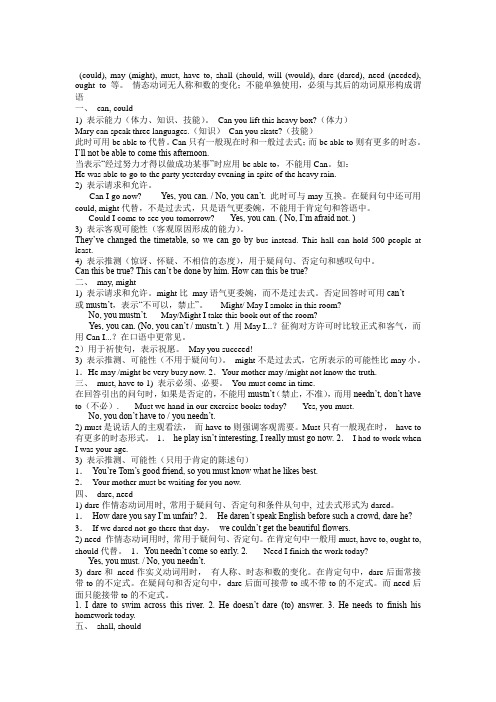
(could), may (might), must, have to, shall (should, will (would), dare (dared), need (needed), ought to等。
情态动词无人称和数的变化;不能单独使用,必须与其后的动词原形构成谓语一、can, could1) 表示能力(体力、知识、技能)。
Can you lift this heavy box?(体力)Mary can speak three languages.(知识)Can you skate?(技能)此时可用be able to代替。
Can只有一般现在时和一般过去式;而be able to则有更多的时态。
I’ll not be able to come this afternoon.当表示“经过努力才得以做成功某事”时应用be able to,不能用Can。
如:He was able to go to the party yesterday evening in spite of the heavy rain.2) 表示请求和允许。
-----Can I go now? ----- Yes, you can. / No, you can’t. 此时可与may互换。
在疑问句中还可用could, might代替,不是过去式,只是语气更委婉,不能用于肯定句和答语中。
---- Could I come to see you tomorrow? ---- Yes, you can. ( No, I’m afraid not. )3) 表示客观可能性(客观原因形成的能力)。
They’ve changed the timetable, so we can go by bus instead. This hall can hold 500 people at least.4) 表示推测(惊讶、怀疑、不相信的态度),用于疑问句、否定句和感叹句中。
七年级英语:情态动词专项练习带答案解析
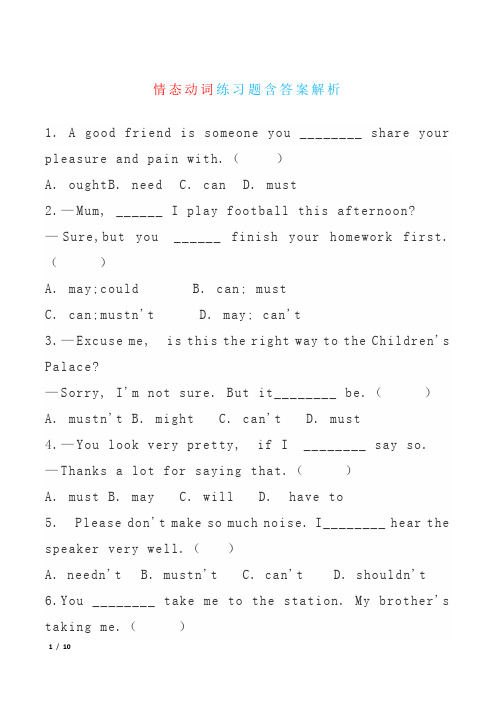
情态动词练习题含答案解析1. A good friend is someone you ________ share your pleasure and pain with.()A. oughtB. needC. canD. must2.—Mum, ______ I play football this afternoon?—Sure,but you ______ finish your homework first.()A. may;couldB. can; mustC. can;mustn'tD. may; can't3.—Excuse me, is this the right way to the Children's Palace?—Sorry, I'm not sure. But it________ be.()A. mustn'tB. mightC. can'tD. must4.—You look very pretty,if I ________ say so. —Thanks a lot for saying that.()A. mustB. mayC. willD. have to5. Please don't make so much noise. I________ hear the speaker very well.()A. needn'tB. mustn'tC. can'tD. shouldn't6.You ________ take me to the station. My brother's taking me.()A. can'tB. mustn'tC. shouldn'tD. don't have to7.—Mum, ________ I visit the Modern ArtMuseum next Monday?—I'm afraid you can't. All the museums in thiscity are closed on Monday.()A. wouldB. needC. shouldD. may8.We need clean air and water,so we ________ protect the environment.()A. canB. mayC. mustD. might9. —What should we do to protect the fish in the river?—We________ throw rubbish into the river.()A. needB. needn'tC. mustD. mustn't10.—What's wrong with Judy? She has been absent for two days.—Oh, she_____ be ill. Let's go to ask Mr. Green.()A. mayB. needC. would11.—We've got everything ready for the picnic.—Do you mean I______ bring anything with me?()A. can't B. mustn't C. couldn't D. needn't12.—Excuse me, ________ I take the magazine out of the reading room?—Sorry, you can't. Just here, please.()A. mustB. wouldC. mayD. need13.Rock music ___ sound popular with the young,but it's not the favor of the aged people.()A. mustB. needC. shouldD. may14.—Must I wait here all morning? I have a lot of work to do.—No, you____. You may be back in the afternoon.()A. mustn'tB. can'tC. don't have to15.The passengers ______ show their ID cards before getting on the plane.()A. mightB. mustC. could16. —Finally, they came back.—They_____ be hungry after such a long walk.()A. can'tB. mustC. needn't17. —I still haven't found my pet dog.—I'm sorry to hear that. You_____ be very sad.()A. canB. shouldC. mustD. will18. —Look at the young lady in red. Is it Mrs.Li?—No. It________ be her. She is wearing a white dress today.()A. mustn'tB. needn'tC. can't19. —Is that man Mr.Zhang?—It________ be him. He went to Beijing for a meeting yesterday.()A. can'tB. mustn'tC. needn't20. The girl in the classroom ________ be Sarah. She has gone to the library.()A. mayB. mustC. can'tD. needn't21. —Whose bike is this?—I am not sure. It ________ be Mary's.()A. shallB. mustC. might22. —Where are you going this month?—We________ go to Xiamen,but we're not sure.()A. needn'tB. mightC. mustD. mustn't23. —Is Tom coming by train?—He________ drive his car,I'm not sure.()A.can't B. may C. Must解析答案句意:一个好朋友就是和你一起分享你的快乐和悲伤的人。
初中英语情态动词练习50题
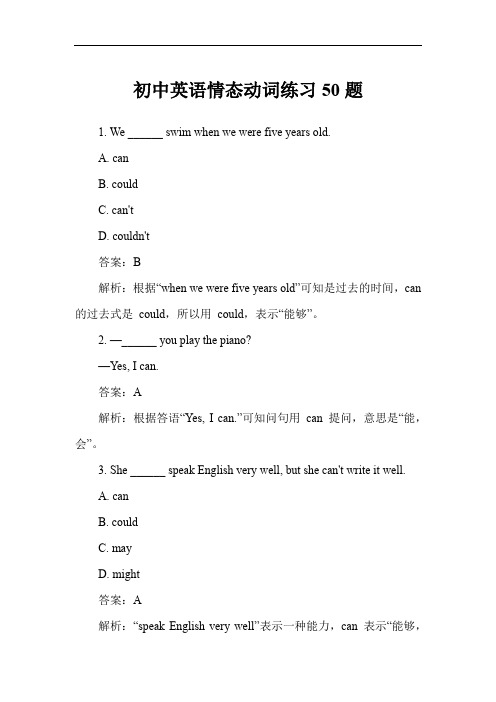
初中英语情态动词练习50题1. We ______ swim when we were five years old.A. canB. couldC. can'tD. couldn't答案:B解析:根据“when we were five years old”可知是过去的时间,can 的过去式是could,所以用could,表示“能够”。
2. —______ you play the piano?—Yes, I can.答案:A解析:根据答语“Yes, I can.”可知问句用can 提问,意思是“能,会”。
3. She ______ speak English very well, but she can't write it well.A. canB. couldC. mayD. might答案:A解析:“speak English very well”表示一种能力,can 表示“能够,会”,符合句意。
4. —______ I use your pen?—Sure. Here you are.答案:C解析:May I...? 表示征求对方的许可,意思是“我可以......吗?”5. You ______ be careful when you cross the road.A. canB. couldC. mustD. might答案:C解析:must 表示“必须”,过马路必须小心,强调必要性。
6. We __________ go to the park tomorrow if the weather is nice.A. mayB. mightC. mustD. can答案:A解析:“may”表示可能性,“might”语气更委婉、不确定,“must”表示必须,“can”表示能够。
根据语境,如果明天天气好,我们“可能”去公园,这里可能性较大,用“may”。
7. She __________ be late for the meeting. I'm not sure.A. mayB. mightC. mustD. can't答案:B解析:“I'm not sure.”表明不确定,“might”比“may”语气更不确定,所以这里用“might”表示她“可能”会迟到。
- 1、下载文档前请自行甄别文档内容的完整性,平台不提供额外的编辑、内容补充、找答案等附加服务。
- 2、"仅部分预览"的文档,不可在线预览部分如存在完整性等问题,可反馈申请退款(可完整预览的文档不适用该条件!)。
- 3、如文档侵犯您的权益,请联系客服反馈,我们会尽快为您处理(人工客服工作时间:9:00-18:30)。
情态动词一、考点、热点回顾【词汇辨析】1.sometimes/ some times/sometime/ some time:sometimes: “有时"=at times。
He is sometimes late for school.some times:“几次” I have been to Nanjing some times。
sometime: “某一时刻” I bought it sometime last spring.We'll meet again sometime next week。
some time: “一段时间” We have to stay here for some time。
2。
many/ much/ a few/ a little/ few/ little(1)many修饰可数名词,much修饰不可数名词;都表示许多。
例如:许多书许多牛奶(2)a few和a little都表示”有一点儿",侧重于肯定,相当于”some",但a few修饰可数名词,a little修饰不可数名词,例如:He has a few friends in London。
--—Would you like some coffee?-——Yes,just a little.(3)few和little表示"几乎没有”,侧重否定。
few后接可数名词,little后接不可数名词。
例如:He is a strange man. He has few words。
Hurry up,there is little time left.【固定搭配】加—ingbe busy doing sth.忙于做……eg:Mother is busy cooking。
look forward to + doing sth. 期待做……eg: Tom looks forward to seeing his father again.Thank you for (doing)sth。
为了…感谢你eg:Thank you for your help。
愉快地做某事eg:I had great fun playing in the water。
=have a good time doing sth eg: I had a good time playing in the water.have problem/trouble/difficulty (in)doing sth。
做某事有困难eg: I have difficulty finishing my homework in 2 hours。
【情态动词】又叫情态助动词。
它们具有以下特点:⑴它们必须与其他动词连用,即:情态动词+动词原形表示说话人对所述动作的看法,如需要、可能、意愿或怀疑等。
⑵绝大多数情态动词没有人称和数的变化,即第三人称单数不加—s(以be和have 开头的情态动词短语除外)。
⑶在意义上,情态动词具有“多义性"。
例:can既可表示能力,又可表示可能、允许等意义。
【情态动词的基本用法】1. can的基本用法:⑴表示体力或智力上的能力,即“能够,会",可与be able to转换。
例:He can speak English。
= He is able to speak English.—Can you play basketball?- No,I can’t.如果表示将来具备的能力,要用will be able to。
例:If I have a good sleep,I will be able to do the problem.⑵表示许可,主要用于口语,书面语一般用may.例:—Can we go home now, please?— No,you can’t。
You can only smoke in this room.You can’t keep the library books for more than a month。
⑶表示“可能”,与may同义,但一般用在疑问句中。
例:What can he possibly want?在否定句中,否定形式can’t表示推测“不大可能”。
例:Anybody can make mistakes。
The news can’t be true.与第一、二人称连用时,还可以就可能的解决问题的方式或可能的行为提出建议。
在这里,也可用could使语气婉转.例:Can / Could we meet again next week?下周我们可以再见面吗?—What shall we do?我们怎么办呢?- We can / could try asking Lucy for help。
-—我们可以请露茜帮忙试试看.You can / could help me with the cooking。
你可以帮我做饭.2。
may的基本用法:⑴表示“许可",用can比较口语化。
例:You may / can come if you wish。
如果你想来,你就来。
You may not pick flowers in this park。
本公园内不许摘花。
(may not表示按规定不许可,如果用mustn't则表示说话人不许可。
)我可以在这里抽烟吗?—mustn't表示明确的禁止。
)⑵肯定句中表示推测,“可能”.例:It may rain tomorrow。
明天可能会下雨。
The news may not be true. 这个消息可能不会是真的.注意:如果例:Can it be true? 那会是真的吗?Who can he be?他究竟是谁呢?⑶【注意】:……?-Yes, you /—No3. must的基本用法:⑴表示必须,强调说话人的主观意志。
例:I must go now,or I'll be late.You must be here by ten o’clock。
【注意】:表示“必须“时,must,而不是mustn’t。
也就是:—Must I/we do it now?—Yes, you—No,例:—Must I go with them?—No,you.⑵表示推测,一般只用于肯定陈述句,表示非常肯定。
例:She didn’t look at me。
She must be angry。
她不朝我看,一定是生气了。
He is good at English. He must know the word. 他英语好,准知道这个词。
You must be Mr。
Jones. 想必您就是琼斯先生吧。
4. have to的基本用法:have to可视为情态动词,但它与其他情态动词在用法上稍有不同。
其他情态动词没有人称和数的变化,而have to却有人称和数的变化,要视主语的不同而变化。
例:I / You / We / They have to…。
He / She / It has to…。
You don't have to….Does she have to…?,意思是“必须,不得不”。
和must不同之处:must强调主观需要have to强调客观需要。
例:Sorry, I have to leave now。
对不起,现在我得走了。
I’ve got to go to a meeting。
我得去参加一个会议。
Will he have to work deep into the night?他将不得不工作到深夜吗?5。
need的基本用法:need的基本词义是“需要",它既可作情态动词,又可作实义动词。
⑴ need用作情态动词时,只用于否定句和疑问句.它只有一种形式,后接动词原形。
例:I don't believe you need worry. 我相信你没有必要焦急。
—Need we go so soon? 我们需要这么早就去吗?— Yes, we must. / No,we needn't. 是的,必须./不,不必。
So I needn't tell him,need I? 所以我不需要告诉他,对吧?请比较以下两句话的不同意思:You needn’t buy the coat. 你没有必要买那件外衣。
(你还没买)You needn’t have bought the coat。
你没有必要买这件外衣的。
(而你却买了)【注意】:I/we……?—Yes,./-No,⑵need用作实义动词时,有时态、人称和数的变化.如果人作主语,一般后接带to的动词不定式。
即如果物作主语,一般后用例如:I need to look up this word in the dictionary.My watch needs mending/to be mended. 我的手表需要修理了。
We don’t need to work today。
(= We needn’t work today。
)Does he need to go right now? (= Need he go right now?)6. had better的基本用法:had bette r常略作’d better。
现代语法认为它是一个助动词,因为它后接不带to的动词不定式。
意思是“最好做某事;还是做某事比较好".例:You'd better get some sleep. 你最好睡一会儿。
You’d better not do that again。
你最好别再做那件事。
What had we better do now? 我们现在怎么做才好呢?Hadn't we better tell her the truth? 我们是否最好不告诉她真相?7. could,should,would, might表示推测:①.must多用于肯定句中表示把握性极大的推测,意思为“一定、肯定".如: You have worked hard all day。
You must be tired. 你已辛苦工作一整天了,一定累了.The book must be his. His name is on the cover。
这本书一定是他的,封面上写着他的名字。
【注意】must不表推测时,在肯定句中意思为“必须(强调内在的职责)”,在否定句中意思为“不许、禁止”,以它开头的疑问句否定回答常用needn’t或don’t (doesn’t)have to。
如:We must obey the traffic rules。
